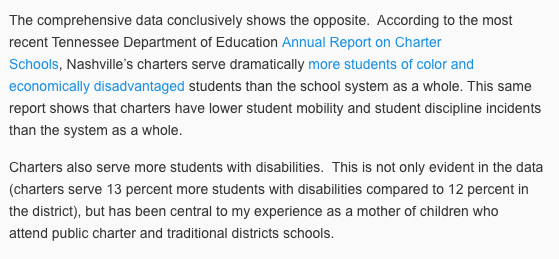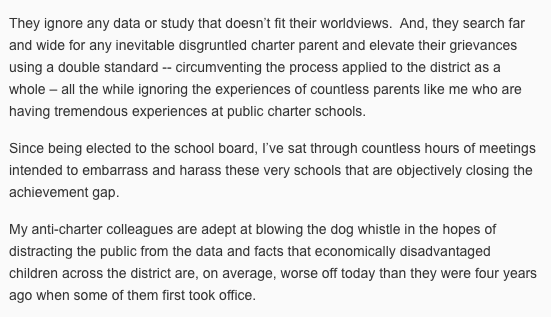Stand for Children is out with it’s list of endorsements in the School Board race and here’s how they start:
With a committed Mayor and the recent selection of Dr. Shawn Joseph as Director of Schools, there remains one major missing piece to improving our public education system: a better school board.
Interestingly, Stand advocates throwing out most of the incumbents running for re-election in order to achieve that “better board.”
But, it’s worth noting that most of the candidates Stand opposes supported Megan Barry in her campaign and the Board united to select Shawn Joseph as Director of Schools. That committed Mayor and new Director came about in as a result of the work of the current Board, not in spite of it.
Nevertheless, Stand says:
Imagine for a moment that we spent the next four years not rehashing the same old fights, but instead debating the best way to attract and support a great principal at every school; the best way to retain and develop our incredible educators; the most innovative ways to support our growing immigrant populations; and or the best way to ensure schools receive adequate and equitable funding and support.
While there have certainly been some vigorous debates on the School Board about how best to serve students in MNPS, the Board also adopted a revised pay scale designed to make the district more attractive to new teachers and bring teacher pay in line with similar urban districts. That same budget also made important investments in support of English Language Learners.
As for adequate and equitable funding, the MNPS Board has taken the state to task for leaving behind the promise of BEP 2.0.
The debate over charters is an important part of the discussion about MNPS, and there are certainly multiple perspectives. On one hand, you have those who raise the issue of cost and on the other, you have those who suggest the cost isn’t that high and the money spent is worth it. Arguably, both sides want what Stand says it wants: A Board focused on what’s best for kids.
Or, maybe they just want less of what they perceive as bickering. Or less dissent from a certain agenda.
The MNPS Board isn’t perfect, but working with Mayor Barry and hiring Shawn Joseph demonstrate a willingness to look past personal differences and focus on what really matters.
For more on education politics and policy in Tennessee, follow @TNEdReport


